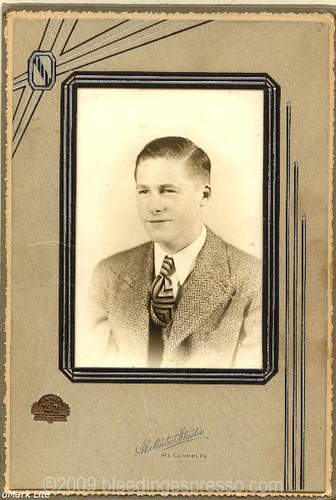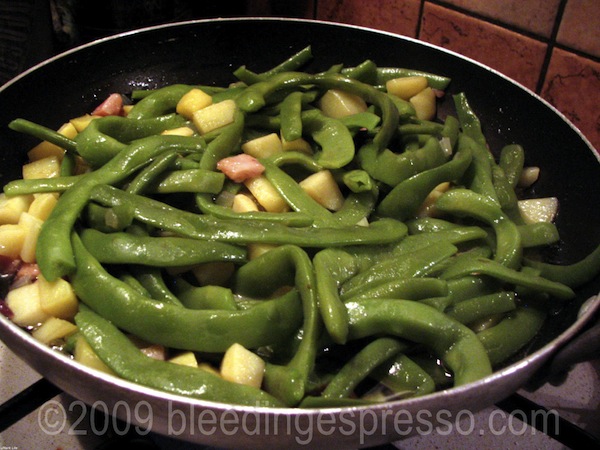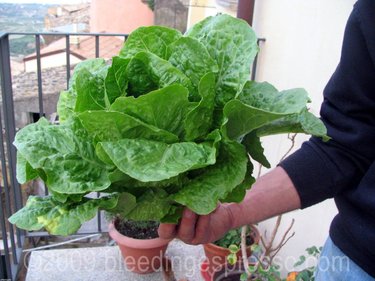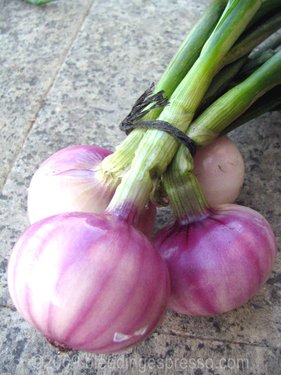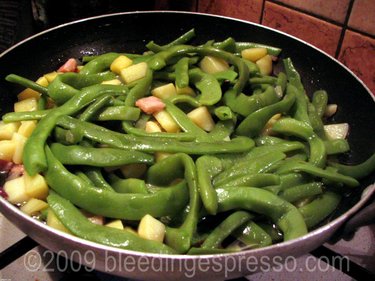Archive for June, 2009
Passeggiata by G.G. Husak
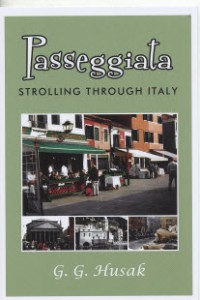 Remember back when G.G. Husak, author of Passeggiata: Strolling Through Italy, guest posted here? Well today we’re talking more about the book; here is my review:
Remember back when G.G. Husak, author of Passeggiata: Strolling Through Italy, guest posted here? Well today we’re talking more about the book; here is my review:
Passeggiata by G.G. Husak is a memoir about the author and her husband’s travels through Italy, to which they return every year. The book covers their visits to Florence, the Italian Riviera, Siena, Assisi, Orvieto, Naples, and more; from big cities to small hill towns, they’ve done it, and you can read about it.
Husak’s love for the Bel Paese and all it offers really shines through her tales—and especially in the fact that she and her husband continue to choose Italy instead of other destinations. “Italy has been a theme that enriches our shared experiences by being integrated into our lives after we get home,” Husak writes.
The book can be a bit slow-moving in parts as Husak seems to want to fit in all the details—and perhaps justifiably so, as the details in Italy are certainly not to be missed. Still, the editing could have been stronger as some parts seemed repetitive or simply went on for a bit too long without enriching the overall story.
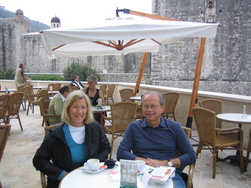 For this reason, I recommend reading this book a chapter at a time, taking in each destination by itself and giving yourself time to reflect on their journeys; imagine yourself sharing a caffè with G.G. and her husband in Florence or walking for miles around a huge wall in Siena that blocks off the old city from the train station.
For this reason, I recommend reading this book a chapter at a time, taking in each destination by itself and giving yourself time to reflect on their journeys; imagine yourself sharing a caffè with G.G. and her husband in Florence or walking for miles around a huge wall in Siena that blocks off the old city from the train station.
This book would be especially good for novice travelers to Italy, even for those who have yet to make their first visit. Many of Husak’s stories involve the types of mishaps, confusions, and glitches that often accompany Italian travel tales; newbie travelers will find it particularly encouraging to know that even when things look dire, they’ll eventually work out—and that strikes, changes in schedules, etc. are just normal, Italian travel experiences that everyone battles.
I give this three espresso cups out of five, mostly because I would have liked it to have been edited better; I enjoyed reading about Husak’s experiences, but aside from the fact that the narrative could have been much tighter, there are also quite a few Italian mistakes (gender, incorrect place names, words sometimes confused with similar Spanish words). This is a pet peeve of mine and could potentially make this book confusing for those newbie travelers I mentioned.
Still, true Italophiles will find a lot to like in this passeggiata through Italy; indeed, it could even be used as a supplemental guidebook as it covers so many wonderful Italian locations.
*
Subscribe to my Book Reviews feed — book reviews ONLY, which aren’t published to the main feed — by visiting Feedburner.
Stella: Colin Galbraith’s New Paranormal Mystery
Loyal readers may have seen “Stella” in the post title and thought of my adorable pooch:
But today we’re back to talking books, in particular, up and coming Scottish author Colin Galbraith‘s new paranormal mystery, Stella, available as both an e-book and paperback as of June 7th:
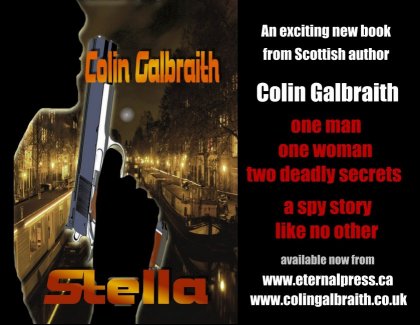
And, since it’s been a while since we’ve had a contest, how’d you like to win your own copy?
Comment on this post by next Friday, July 3, 2009 by 11:59 p.m. (Italy time) to be eligible to win a copy of Stella. If you win, you can choose either the paperback or e-book version. Winner will be announced Sunday, July 5, 2009.
What’s Stella all about?
Randolph Lowe is a distinguished British Secret Agent in the twilight of his career. When he is handed a mission to kill one of the world’s least accessible, yet most wanted assassins, he never expected a beautiful young woman with the alias, STELLA.
Stella leads him around the world as she picks off her marks with ease, during which time Randolph grows infatuated and falls in love.
But Stella has her own dark secret. Forced into making a terrible sacrifice, she is destined to live her life as a lone killer.
The love of one man may be enough to free her, and only that man can save her now… but only if he can find her….
——-
Mystery. Intrigue. International spy games. Paranormal. Love. What’s not to enjoy about this book?
I haven’t read it yet, but I will very soon. Sounds like a great summer read with a fast pace and lots of twists and turns. Plus I always enjoy the paranormal thrown in….
Perhaps you’re wondering about the author?
 Colin Galbraith is an author of published short stories, poems, articles and reviews, in both print and online publications. His novel, Hunting Jack, was serialised in 2004, and his chapbook, Fringe Fantastic: The Poet’s Experience of the Edinburgh Fringe Festival, was published by Smashing Press in December 2005 to critical acclaim. Poolside Poetry soon followed, published in March 2007.
Colin Galbraith is an author of published short stories, poems, articles and reviews, in both print and online publications. His novel, Hunting Jack, was serialised in 2004, and his chapbook, Fringe Fantastic: The Poet’s Experience of the Edinburgh Fringe Festival, was published by Smashing Press in December 2005 to critical acclaim. Poolside Poetry soon followed, published in March 2007.
Colin has also published three e-chapbooks: Brick by Brick (2005), Silly Poems for Wee People Vol.1 (2006), and Selektion (2007). He edited his first anthology, Full Circle, in 2007 and his hugely popular children’s poem, River Monkeys, appeared in the anthology, A Pocketful of Fun, published by Forward Press in 2006.
He is proud to be the Chief Editor and Publisher of The Ranfurly Review literary e-magazine, and an Associate Editor at The Scruffy Dog Review.
Colin lives in Edinburgh with his wife and daughter, two rabbits and a shoal of fish. He is a fully trained expert in the art of fake falling.
——-
5 Questions with Colin Galbraith
1. What was the inspiration for Stella?
The idea for STELLA first came to me in 1988. I was listening to an album of the same name by Yello, and I developed a series of images to certain songs in my mind as I listened to the album. I always promised myself I would one day write these images down into a cohesive text, but it wasn’t until 2007 that I felt my writing had developed enough that I could give it a bash.
I began by writing down these images, and from that I used the music to further inspire the gaps in between. Slowly, a story began to unfold until I had a first draft. It took a lot more work to make it into what it is today and I’m delighted with how it turned out.
2. What research went into writing Stella?
Not as much as you might think. Most research concerned the locations in the book that I hadn’t been to, but which I wanted to appear in the book. It’s fast moving story and takes the reader all around the world, so while I could write vividly about Prague, Amsterdam and London, I knew little of San Francisco, Brooklyn NY and Fes, Morocco.
There was also a bit of research into demons and black roses, but mostly it’s all made up – the kind of writing I enjoy most.
3. Why write a paranormal mystery? You’ve never written in this genre before?
It wasn’t meant to be a paranormal book. My original idea was for the book to be a spy novella, something with its roots in the mysteries of underground eastern Europe. As the ideas began to develop on paper, though, the book began to take on its own form and it made sense for a paranormal aspect to come into it. I can’t honestly see it working without it now.
4. Will we see more of Stella and Randolph?
STELLA was originally meant as a personal writing experiment and I never meant, or expected it, to ever be published. However, now it has been, and having enjoyed working with Stella and Randolph so much, I want to do more with them.
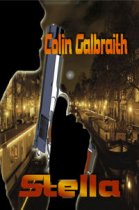 Both Stella and Randolph are such strong characters and there are so many questions I have now STELLA is behind me, that I want to find out more about them. And where the author has questions, so too I expect will the readers.
Both Stella and Randolph are such strong characters and there are so many questions I have now STELLA is behind me, that I want to find out more about them. And where the author has questions, so too I expect will the readers.
I’ve already begun work on the sequel and am planning on making their story into a trilogy. The book I am writing just now – the sequel to STELLA – is called BACCARA BURNING, which will take Randolph and Stella’s relationship to the extreme. It will be a real test of their love and trust, and through this we will get to know the real them. Both have lived dark and hidden lives, but in Baccara Burning the cloaks are gone and there is no hiding any longer.
The book starts in Sorrento, but ultimately I want to bring them to my home town of Edinburgh, throw in a local ghost legend or two and see what happens.
5. Tell us a bit about your writing process. Do you have a particular routine you follow?
My daily schedule is usually hampered by the inconvenience of a day job, which means I have to work around it. I get up around 5 am most days and write or take care of some editing while I have my breakfast. Then it’s off to the day job and if I can squeeze it in, take care of some admin or prepare emails I have to send out when I get back home during my lunch break. After work, family duties take over for a while before I’ll sit down and write into evening.
That’s the routine. My writing process, however, varies greatly depending what it is I’m writing. If it’s a newspaper review I’ll have the piece researched, drafted and submitted all within a few hours of getting the commission. This includes writing two drafts, one long and one short to make it easier for the editor, but also means a concentrated effort to get it out.
With fiction I try and get down an average of 2k per day, though it doesn’t always work out. When I’m writing a novel I’ll try and get those words down first thing in the morning, because I’m at my best at that time and I find it tees me up for the rest of the day. If I could write all day I would, and if I really had a choice in the matter I would probably write through the night, but we can’t have all it our way!
Thanks so much for stopping by, Colin; can’t wait to read your book!
Readers, remember to comment on this post for your chance to win a copy of Stella!
Adjusting to Expat Life in Italy
 I’m finally getting around to answering more of your questions from way back when. After today’s answers, the only questions that remain, I believe, are blogging-related, and I’ve answered those in my FAQ page. Have you seen my new FAQ page by the way? Go ahead, click it! And let me know what you think!
I’m finally getting around to answering more of your questions from way back when. After today’s answers, the only questions that remain, I believe, are blogging-related, and I’ve answered those in my FAQ page. Have you seen my new FAQ page by the way? Go ahead, click it! And let me know what you think!
OK, back to today’s post, which answers some questions about adjusting to life as an expat in Italy.
1. Janie (whose blog seems to have disappeared! Aiuto!) asked how I was received by the residents.
Actually *really* well. Sure, many wondered why I would choose to move here and be (gasp) so far away from my mother, but the villagers have always been really helpful and kind, even before I knew P.
I’ve mentioned plenty of times that it’s not uncommon to be given bags of fruit and other edible gifts, but the villagers are also always up for a chat or to help carry packages as well; in general, I have to say the people here are just nice, or at least they have been to me.
2. Knowing that I’m a lot addicted to reading, Franca asked about buying books here.
I’ve said it before and I’ll say it again: I’m *really* spoiled when it comes to books. People (including my mom) send me them rather often, and I also get quite a few review copies through the blog.
I very rarely order books, but in the past, I’ve just ordered through Amazon; you can use the UK site if you’re worried about shipping issues. There are also some Italy-based sellers such as IBS.it, Webster.it, and LaFeltrinelli.it that carry some English-language books as well.
 3. Franca also asked about dealing with being away from family.
3. Franca also asked about dealing with being away from family.
Hmm. Well, that’s something that is undoubtedly different for everyone. I consider myself extremely close emotionally to my family, but I haven’t lived physically close to them since I was 17 (except for a few summers).
I’ve had to rely on phone calls, letters, e-mails, etc., to keep in touch for quite a long time, so I suppose in a way I’m kind of used to being away from them now. The holidays and certain special occasions can be difficult, but how do you get through anything tough?
Me? I cry or I don’t; I keep myself busy or I don’t; I reminisce about the past or I don’t; I plan trips home or I don’t. You know, I don’t know. It’s really hard for me to give advice on this because what works for me won’t work for everyone–heck, what works for me one day may not work the next.
I guess my best advice is that you do your best to work through the feelings of missing your loved ones in your home country, and if you really feel like you’re unhappier here than you would be there, you move back.
Or at least that’s what I would do. I think.
Fellow expats or those who have moved away from “home,”
what are your adjustment tips?
Shout Out to the Daddies of the World
Just wanted to wish a Happy Father’s Day to all the dads, especially mine!
And to my grandfather, Pap Pap, wherever he may be:
To my mom’s father, also wherever he may be (sadly no photo here with me).
And to all the rest of my grandfathers back into family history–especially to:
(1) My great-grandfather Aniello D’Isabella, who I never got to meet but whose lack of desire to get American citizenship after leaving his southern Italian village allowed me to reclaim his Italian citizenship many years later and live here happily ever after without bureaucratic hassle; and
(2) My great-great-grandfather Giuseppe Bressi whose village I now call home.
Auguri to all you daddies out there!
What’s Cooking Wednesday: Green Beans, Pancetta, and Potatoes
 This week’s What’s Cooking Wednesday recipe screams summer because of the gorgeous fresh fagiolini (green beans) that star in the dish; a more hearty version of this basic combo can be found at my recipe for Pork, Green Beans, and Potatoes in Tomato Sauce.
This week’s What’s Cooking Wednesday recipe screams summer because of the gorgeous fresh fagiolini (green beans) that star in the dish; a more hearty version of this basic combo can be found at my recipe for Pork, Green Beans, and Potatoes in Tomato Sauce.
Now, before we get started, if you think you don’t like green beans, please find some fresh ones. Trust me, they have nothing to do with canned green beans (to be honest, I’m not a huge fan of those either). As with any beans, they take a little prep work (washing, snapping off the ends, and blanching), but they are *so* worth it.
We didn’t grow our own fagiolini this year, but we will definitely give it a go next year. The beans used in this recipe, of course, are locally grown though. And if you’re curious as to what *is* going on in our garden, check out our:
Lettuce/lattuga:
Onions/cipolle:
The cucumbers and tomatoes are ripening as I type! Yay!
OK, the recipe. Traditionally instead of the pancetta, the Badolatese would use “carne salata,” spicy, salty lard particular to here; (luckily) we didn’t have any, so we substituted pancetta, and it worked great. You can use cubed ham if you’re short on pancetta.
Green Beans, Pancetta, and Potatoes
Fagiolini con pancetta e patate
- 5 tablespoons olive oil
- Half kilo (about a pound) of fresh green beans
- One medium onion, diced
- 100 grams (about 1/4 pound) of pancetta, cubed
- 4 medium potatoes, peeled and cut into chunks or cubed (your choice)
- Salt to taste
1. Wash beans and snap (or snip) off ends.
2. Bring a pot of water to boil, then drop in beans for about 3-5 minutes until they are bright green but still rather al dente. Many say to then drop them into a waiting bowl of ice water to stop the cooking process, but I never do–they’re always fine, and I save myself another dish to wash. You just have to get used to when to take them out, that’s all.
3. Put about five tablespoons of oil in a large frying pan and heat over medium. When the oil is hot, add the onions and let saute for a couple of minutes.
4. Add pancetta to pan, again letting it saute for a couple minutes, then add potatoes and mix together.
5. The potatoes will take the longest to cook, of course, so let this mixture cook for about 15-25 minutes–depends on how large your potato chunks are.
6. Add the green beans and some salt and mix everything together. Let cook for another 10 minutes or so, stirring and adding water if it gets a bit dry. The dish is ready when the potatoes and beans are cooked to your satisfaction. Be sure to adjust for salt.
7. Serve hot with bread–or eat leftover cold the next day as a salad. YUM!
Buon appetito!




